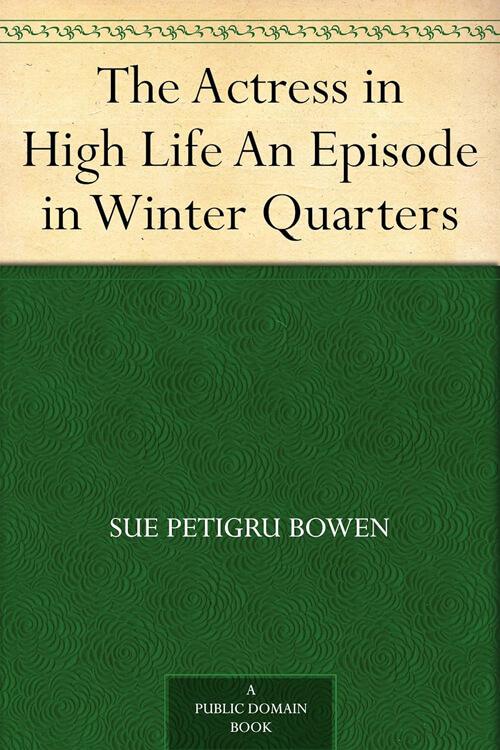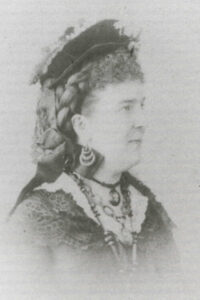
The Actress in High Life, An Episode in Winter Quarters
You may, perchance, on your journey, see a goatherd or a shepherd here or there; by rarer chance may meet some wayfarer like yourself, but as likely a robber as an honest man; and may find shelter, at least, in one of the few and comfortless vendas, the wretched inns the route affords.
You need not pause to gaze on many a wild scene, some beautiful, and even here and there a fertile spot; nor loiter in this provincial town—rich, perhaps, in Moorish ruins, but in nothing else—but hasten onward till you reach that elevated point, where the road, one hundred miles from Lisbon, winds over the ridge of yonder hill. The chilly night winds of the peninsula have gone to sleep. Here, even in midwinter, the sun at this hour shoots down scorching rays upon your head. Seat yourself by the roadside, on this ledge of slate-rock, at the foot of the cork-oak, which so invitingly spreads out its sheltering arms. Here while you take a breath, cast your eyes around you.
You are no longer amid broken, desolate wastes. To the south-west rises the Serra d’Ossa—its sides clothed with evergreen oaks, and a dense growth of underbrush sheltering the wolf and the wild boar, while the northern slope of its rocky ridge is thatched with snow. Before you are spread out the valley of the Guadiana. Sloping downward toward the mighty stream, lay pasture, grove, and field, gaily mingled together. There, to the east, sits Elvas, on a lofty hill, whose sides are covered with vineyards, olive yards, and orchards, and just north of it, on a yet loftier peak, with a deep narrow valley lying between them, stands the crowning castle of La Lippe, the strongest fortress in Portugal. Far beyond, but seen through the clear atmosphere of the peninsula, now doubly transparent since it has been purified by the heavy rains which here usher in the winter, rises the blue mountain of Albuquerque, far away in Spanish Estremadura. Whichever way you look, Sierras, nearer or more distant, tower above the horizon, or fringe its utmost verge.
Among these scenes of nature’s handiwork, a production of human art demands your attention. See, on your right, the beginning of the ancient aqueduct, reared by Moorish hands, which leads the pure mountain stream for three miles across the valley to the city seated on the hill. Here, the masonry is but a foot or two above the ground; below, the road will lead you under its three tiers of arches, with the water gliding a hundred feet above your head.
Read or download Book
Sue Petigru Bowen
Susan Dupont Petigru King-Bowen (24 October 1824 – December 11, 1875) was a 19th-century American socialite, realist, fiction writer, and novelist. Her work, which included Busy Moments of an Idle Woman (1853), Lily: A Novel (1855), Sylvia’s World: Crimes Which the Law Does Not Reach (1859), and Gerald Gray’s Wife (1864), focused on subversive portrayals of South Carolina aristocracy, in which men toyed with women’s affections, women plotted against one another’s best interests, and mothers forced daughters to choose wealth over romance.
Biography
Susan Dupont Petigru, known as “Sue”, was born on October 23, 1824, as the youngest of four children. She was raised in her family’s home on Broad Street, within the center of Charleston’s elite business and social district. Her father, James Petigru, was an attorney and politician, while her mother, Jane Amelia Petigru, was the daughter of a rich Charleston planter. Her father was gone at least four months of the year on business, and the rest of the time thoroughly preoccupied with work.
Her mother suffered an emotional breakdown when Sue was only two years old. Her oldest brother, eight-year-old Albert, died from a fall off their third-floor banister. This event, coupled with caring for three young children and three of James’s adolescent sisters, left Jane Amelia a physical and emotional wreck. She began to develop a series of illnesses, some real and some feigned, which increased her social isolation and encouraged a lifelong addiction to morphine. James’s sister Harriette wrote that Jane Amelia was an “unnatural” woman who “lies in bed from morning till night with every luxury about her & complains of poverty”, and “makes her husband’s time at home wretched.” Another sister-in-law, Louise Porcher, stated Jane Amelia possessed “heartless selfishness” and an obsession with “flattery & adulation,” all traits that would later be ascribed to her daughters.
Sue attended school first at Madame Talvande’s French School for Young Ladies in Charleston, along with classmate Mary Boykin Chesnut, and later at Madame Binsse’s in Philadelphia. At Talvande’s in particular she focused on French, the required language for both instructional and social dialogues, but she also studied chemistry, botany, astronomy, literature, rhetoric, German, art, dancing, and music. The young women also attended social gatherings amongst their Madame’s acquaintances, during which they were expected to learn and practice their grace and etiquette. Sue, expecting the urban North to contain a world of excitement and adventure, was frequently discouraged by the social restrictions created by her father’s unwillingness to produce appropriate financing. She frequently wrote back complaining of malaise and depression, which her father claimed was feigned. Years later, Sue wrote, “It is so long since I have left this part of the country nine years; and when I was at the North, I was too young to appreciate or know its advantages.”
While he did not encourage her reckless spending, Sue’s father did encourage her love of reading and writing. He did, however, worry about her marriage prospects, having recognized that Sue bore both his wit and temperament, without any ability or desire to control it.






